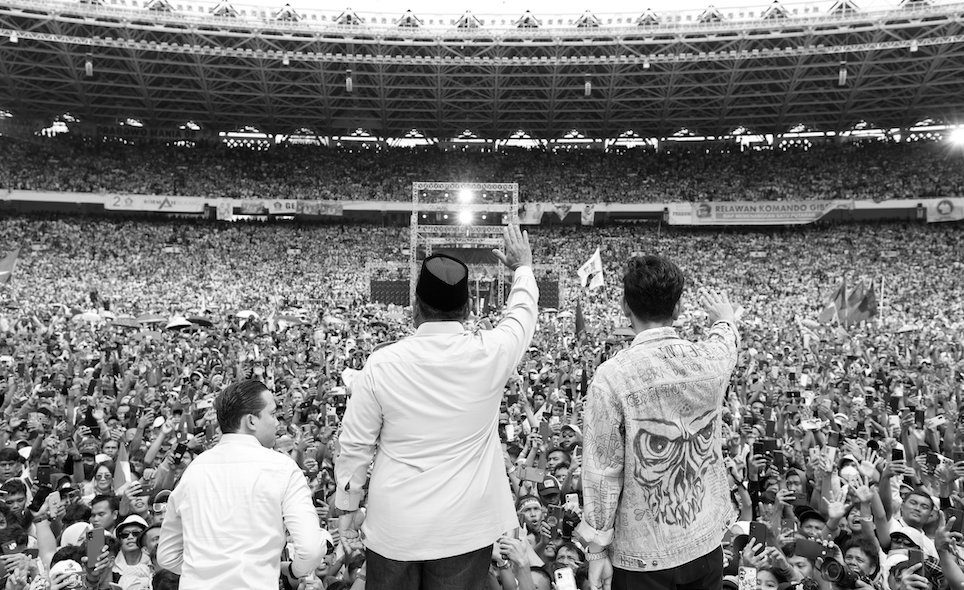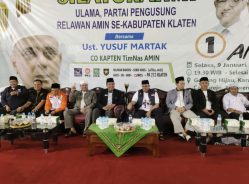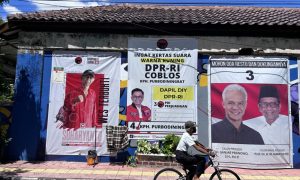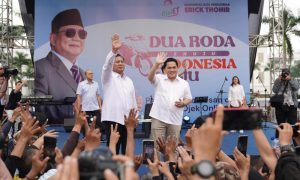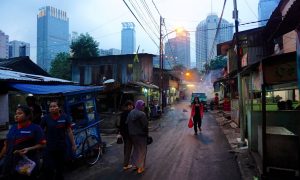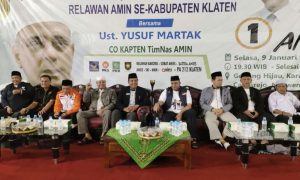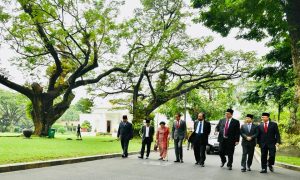According to all credible quick counts, Prabowo Subianto will be the next president of Indonesia. He and his running mate, President Joko Widodo’s son Gibran Rakabuming Raka, won the three-way race with a convincing 58% of the votes, easily clearing the 50% threshold required to win in a single round.
The losing candidates, former Jakarta governor Anies Baswedan and former Central Java governor Ganjar Pranowo, may challenge these results in the Constitutional Court, and some protest from civil society groups is expected. But it is unlikely that the outcome will change given the large margin of victory and because there is little evidence to suggest outright vote rigging. Instead, intervention in the process came before the election, when President Widodo (Jokowi) unabashedly mobilised social assistance funds and the bureaucratic apparatus to guarantee a quick victory for his former foe and, most importantly, to put his son in the vice-presidential office.
From strong man to statesman
Prabowo is a relic of Indonesia’s authoritarian past with a blotted human rights record. But he has proved to be a persistently popular political figure. He came within striking distance of the presidency in 2014 and 2019, using both ultranationalist and Islamist appeals. Both times, he managed to secure around 45% of the vote thanks in part to a committed core of supporters.
After losing again to Jokowi in 2019, many thought Prabowo had reached the twilight of his political career. But in a surprising move, Jokowi appointed him to the strategic post of defence minister. This arrangement not only neutralised Prabowo as an opposition figure, but also gave the aging strongman a chance to rehabilitate his image.
Over the past four years Prabowo transformed his public persona from that of a political troublemaker to a mature statesman. His term as defence minister signalled to both domestic and international audiences that he was fit for high office, and that he could put personal ambition to the side in service of his country and his once bitter rival.
After Prabowo, now 72, declared he would contest the presidency again in 2024, he began to campaign with a message of continuity. Not only would the ‘new’ Prabowo maintain Jokowi’s economic policies, but he also cut a calmer, more considered and inclusive figure. Prabowo went farther to boost his popularity among young voters, the under-40s who comprise more than half of the electorate, through a carefully curated social media campaign that recast his macho image as an endearing old man.
Presidential desire meets post-presidential ambition
On its own, Prabowo’s image rehabilitation strategy proved effective and gave him a small lead over the other two, much younger candidates, Anies (54) and Ganjar (55). But in order to win, he needed to expand support beyond his loyal base—and it was his former foe that provided the tools to do so.
Once heralded as a new hope for democratic Indonesia, over the course of his second term Jokowi had become increasingly authoritarian and concerned with securing post-presidential influence and legacy. Around the Covid-19 crisis, he first tried to extend his time in office beyond the constitutionally permitted two terms, and then to delay the elections. Both schemes were thwarted by the leader of his own party, PDIP’s chairperson Megawati Soekarnoputri. Long irked by Jokowi’s refusal to comply with party directives, she was determined to field a more obedient candidate in 2024.
Jokowi’s ambition found an unlikely ally in his former rival. Prabowo needed the endorsement of the popular incumbent to boost his electability; Jokowi wanted his eldest son, Gibran, on Prabowo’s ticket to retain power after leaving the presidential palace.
But Gibran was barred from running because the 2017 Election Law set a minimum age of 40 to appear on the presidential ballot. In a shocking move, the Constitutional Court, headed by Jokowi’s brother in law, created a legal loophole that cleared the way for the 36 year old to run on Prabowo’s ticket.
Analysts and activists alike believed this brazen act of nepotism would prompt a backlash; but Jokowi’s popularity continued to hover above 75 percent. In a country where provincial and municipal governments are littered with dynastic figures, most voters remained unconcerned about Gibran’s sudden entry into the presidential race. Jokowi’s popularity also made the two rival candidates wary of attacking him for bending the law to favour his son.
With Gibran by his side, Prabowo’s poll ratings soared from 37 percent in October to 47 percent in December 2023. This lead in the polls would, according to opinion surveys, be enough for the pair come first in the initial electoral round, and to then win a runoff election with a comfortable lead of almost 30 points against either of the two rivals. But with his son on the ticket, the stakes were too high for Jokowi to leave anything to chance.
No holds barred for a quick win
The campaign for a swift victory involved unprecedented intervention on the part of the outgoing president. First, Jokowi flaunted established norms of neutrality for a sitting Indonesian president and insisted on his right to take sides in the election. He repeatedly and publicly demonstrated his support for Prabowo and his son, sending clear and effective signals to the electorate. This endorsement boosted their lead in the polls.
Second, the president used his control over state institutions to drum up support in sympathetic quarters and depress votes for rivals. The main battle grounds were Central and East Java, and the target of this strategy was Ganjar, presidential nominee of PDI-P. It is the party to which Jokowi belongs but with whom he split in order to put Gibran on Prabowo’s ticket.
Indonesian Islamists’ pragmatic pivot in 2024
Hardliners are adapting to electoral realities—and state restraints—in mobilising for Anies Baswedan.
Alongside these carrots, Jokowi also deployed sticks. In the lead up to election day, Indonesian lawyers and journalists documented how local bureaucrats and regional executives in parts of Java were threatened with corruption investigations and pressured by law enforcement to get out the vote for Prabowo and Gibran.
Some district and village heads in competitive areas suddenly found themselves being investigated for misuse of public funds but charges disappeared when they showed up to campaign for the pair. Others were told that release of social welfare assistance would be contingent on delivering votes for Prabowo–Gibran. To be sure, PDI-P countered this campaign using its own resources as well as its loyal regional and village heads. But this was no match for the state resources that Jokowi could mobilise.
It is difficult to say with certainty whether or to what extent these sorts of tactics had a significant impact on the final result. Regardless, the leveraging of incumbency in this way sets a dangerous electoral precedent.
All credible polls showed that Prabowo and Gibran had the popular support to win the presidency in a two-round race. They ran a far more sophisticated campaign than their rivals, and successfully courted young voters. Backed by most of the country’s major oligarchs and tycoons, their campaign team was awash with funds. They also had explicit endorsements from Indonesia’s largest Muslim mass organisation, Nahdlatul Ulama.
Much to the dismay of those concerned about Prabowo’s violent past, it was looking like an unstoppable campaign. But Jokowi’s impatience with the democratic process has undermined one the most durable feature of Indonesia’s democracy: electoral competition.
A stress test for Indonesia’s democracy
Over the past decade, numerous scholars and activists have raised serious concerns about democratic regression in Indonesia, which is occurring in line with global trends. The lack of democratic opposition, the dominance of oligarchic power, vote buying, and worsening human rights conditions have contributed to this decline in democratic quality. But there was a general consensus that Indonesia’s elections remained competitive.
Partisan behaviour of state officials is observed with some regularity in Indonesian elections. But the centralised nature of intervention in 2024, its scale and the brazenness with which it was done, is unprecedented in Indonesia’s brief democratic history. It is more reminiscent of elections under Suharto’s rule, when state machinery was routinely cranked to ensure a victory for the regime-backed party, Golkar.
Political parties in rival coalitions are indeed crying foul. But these same parties served in Jokowi’s parliamentary coalition over the past ten years and actively supported his attempts to dismantle checks on executive power. They agreed to stripping the anti-corruption body of its independence, packed top courts with sympathetic judges, and passed laws that criminalise dissent.
A Prabowo presidency was once considered a serious threat to Indonesia’s democratic institutions, and Jokowi was viewed as the antidote. But Prabowo now inherits a democracy far weaker than the one he sought to rule ten years ago. It is not clear whether Prabowo will choose to keep Jokowi’s influence in his government or isolate him in order to draw aggrieved parties into his camp. What is clear, however, is that without principled opposition in parliament to hold the new president accountable, Indonesia democracy will continue its downward trajectory.
 Facebook
Facebook  Twitter
Twitter  Soundcloud
Soundcloud  Youtube
Youtube  Rss
Rss 